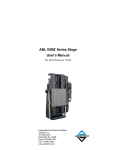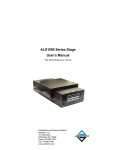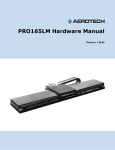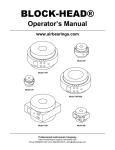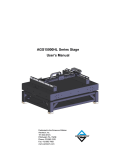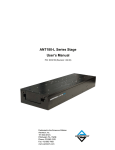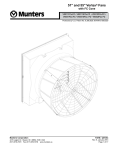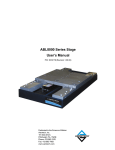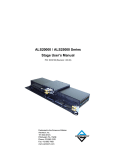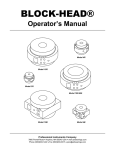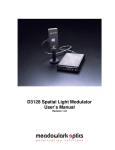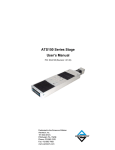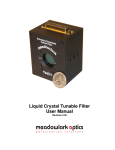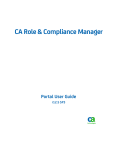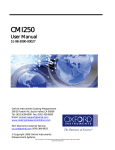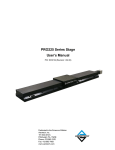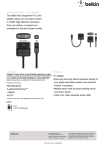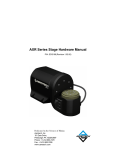Download ABL1500-B Series Stage User`s Manual
Transcript
ABL1500-B Series Stage User’s Manual P/N: EDS165 (Revision 1.02.00) Dedicated to the Science of Motion Aerotech, Inc. 101 Zeta Drive, Pittsburgh, PA, 15238 Phone: 412-963-7470 Fax: 412-963-7459 www.aerotech.com Product Registration Register online at: http://www.aerotech.com/prodreg.cfm Technical Support United States Headquarters: Phone: (412) 967-6440 Fax: (412) 967-6870 Email: [email protected] United Kingdom: Phone: +44 118 940 9400 Fax: +44 118 940 9401 Email: [email protected] Germany: Phone: +49 911 967 9370 Fax: +49 911 967 93720 Email: [email protected] Japan: Phone: +81(0)47-489-1741 (Sales) Phone: +81(0)47-489-1742 (Service) Fax: +81(0)47-489-1743 Email: [email protected] China: Phone: +852-3793-3488 Email: [email protected] Revision History Revision 1.02.00 April 18, 2011 Revision 1.01.00 February 25, 2011 Revision 1.00.00 October 11, 2010 Product names mentioned herein are used for identification purposes only and may be trademarks of their respective companies. © Aerotech, Inc. 2011 ABL1500-B Series Stage User's Manual Table of Contents Table of Contents Table of Contents List of Figures List of Tables iii v vii Chapter 1: Overview 1 1.1. Standard Features 1.1.1. Optional Features 1.2. Dimensions 1.3. Safety Procedures and Warnings 1.4. EC Declaration of Incorporation Chapter 2: Installation 2.1. Unpacking and Handling the Stage 2.2. Preparing the Mounting Surface 2.3. Securing the Stage to the Mounting Surface 2.4. Attaching the Payload to the Stage 2.5. Electrical Installation 2.6. Air Requirements Chapter 3: Operating Specifications 3.1. Environmental Specifications 3.2. Accuracy and Temperature Effects 3.3. Basic Specifications 3.4. Load Capability 3.5. End of Travel Limits 3.5.1. Limit Operation 3.5.2. Limit Switch Wiring 3.5.3. Limit Operation with the -LNAS Encoder Option 3.6. Standard Motor Wiring 3.7. Vacuum Operation Chapter 4: Maintenance 4.1. Service and Inspection Schedule 4.2. Cleaning and Lubrication 4.2.1. Recommended Cleaning Solvents 4.2.2. Cleaning Process 4.2.3. Bellows Re-lubrication 2 3 5 7 9 11 12 13 14 16 17 19 21 21 21 22 26 28 28 28 30 31 34 35 35 36 36 37 38 Appendix A: Warranty and Field Service 39 Appendix B: Technical Changes 41 Index 43 Reader's Comments 45 www.aerotech.com iii Table of Contents iv ABL1500-B Series Stage User's Manual www.aerotech.com ABL1500-B Series Stage User's Manual List Of Figures List of Figures Figure 1-1: Figure 1-2: Figure 1-3: Figure 1-4: Figure 2-1: Figure 2-2: Figure 2-3: Figure 2-4: Figure 2-5: Figure 2-6: Figure 2-7: Figure 2-8: Figure 3-1: Figure 3-2: Figure 3-3: Figure 3-4: Figure 3-5: Figure 3-6: Figure 4-1: Figure 4-2: Typical ABL1500-B Series Linear Positioning Stage ABL1500-B Series Stage (Labeled) ABL1500-B Dimensions ABL1500-B XY Dimensions Lifting Features Results of Flat Versus Non-Flat Mounting Surface Mounting Screws Bellows Cover Attachment Electrical Connections 25 Pin Conductor Cable Connections (Optional) Air Fitting (4 mm (5/32 in) O.D.) Location for Air Bearing Air Fittings (4 mm (5/32 in) O.D.) for Customer Use Location (Optional) Cantilevered Load Capability Cantilever Length Diagram Pitch Offsets Yaw Offsets Current Sourcing or Current Sinking Limit Output Configuration -LNAS Encoder Option Limit Wiring Air Bearing Surfaces and Encoder Scales Require Periodic Cleaning Bellows Re-Lubrication www.aerotech.com 1 2 5 6 12 13 15 15 17 18 19 19 26 26 27 27 29 30 37 38 v List of Figures vi ABL1500-B Series Stage User's Manual www.aerotech.com ABL1500-B Series Stage User's Manual List of Tables List of Tables Table 1-1: Table 3-1: Table 3-2: Table 3-3: Table 3-4: Table 3-5: Table 3-6: Table 3-7: Table 3-8: Table 3-9: Table 3-10: Table 4-1: Table B-1: Table B-2: Model Numbers and Ordering Options Environmental Specifications ABL1500-B Series Specifications ABL1500-B Series Resolution Information ABL1500-B Motor Specifications -LNAS Encoder Option Limit Signals Motor Connector Pin Assignments Feedback Connector Pin Assignments Connector Wiring Pinout Descriptions User I/O (-XIO or -YIO option) Connector Pin Assignments (Qty. 2, Optional) User I/O (-XIO or -YIO option) Mating Connectors Recommended Cleaning Solvents Current Changes (1.02.00) Archived Changes www.aerotech.com 3 21 22 24 25 30 31 31 32 33 33 36 41 42 vii List of Tables viii ABL1500-B Series Stage User's Manual www.aerotech.com ABL1500-B Series Stage User's Manual Overview Chapter 1: Overview This manual describes Aerotech’s ABL1500-B series of air bearing positioning stages. Figure 1-1 shows a typical ABL1500-B positioning stage. The ABL1500-B series supports travel distances ranging from 50 mm to 500 mm (2 in to 20 in). The ABL1500B combines excellent pitch/yaw characteristics with the unsurpassed velocity control that is necessary for printing, imaging, lens fabrication, and fiber-optic applications. The integral bellows protect the stage from abrasive debris and other contaminants. This chapter introduces standard and optional features of the ABL1500-B stages and gives general safety precautions. Figure 1-1: Typical ABL1500-B Series Linear Positioning Stage N O T E : Aerotech continually improves its product offerings, and listed options may be superseded at any time. Refer to the most recent edition of the Aerotech Motion Control Product Guide for the most current product information at www.aerotech.com. www.aerotech.com Chapter 1 1 Overview ABL1500-B Series Stage User's Manual 1.1. Standard Features The ABL1500-B series stages all incorporate completely non-contact air bearing surfaces, linear motors, and feedback devices to provide a minimum maintenance stage. The integral bellows protect the stage in harsher environments where light debris is present. The ABL1500-B incorporates air-on-air preload on both vertical and horizontal surfaces. The opposing thinfilm pressure maintains the bearing nominal gap tolerance. This design, in addition to the large air-bearing surface that distributes the load over a large surface area, results in a stage with outstanding stiffness that is ideal for heavy or offset loading. The brushless linear motor uses an ironless forcer, which means there is zero cogging and no attractive forces – resulting in unsurpassed smoothness of motion. This is especially useful in applications where velocity control is important. The bellows seal the internal components of the stage. This protects the air bearing surfaces, motor, encoder, and all other elements of the stage from dust, dirt, chips, and light oil that would otherwise damage the stage. Figure 1-2: 2 ABL1500-B Series Stage (Labeled) Chapter 1 www.aerotech.com ABL1500-B Series Stage User's Manual Overview 1.1.1. Optional Features The ABL1500-B can be readily customized to meet the needs of individual applications. Common examples include cable management for stage-mounted payloads, custom tabletops, and granite bases. Contact the Aerotech factory for more details. Ordering Example: ABL15010-B-M-10-NC-LN10AS-SINGLE-CMS Table 1-1: Model Numbers and Ordering Options ABL1500 Series Linear Air-Bearing Stage ABL15005 50 mm (2 in) travel linear air-bearing stage with linear motor and limits ABL15010 100 mm (4 in) travel linear air-bearing stage with linear motor and limits ABL15020 200 mm (8 in) travel linear air-bearing stage with linear motor and limits ABL15030 300 mm (12 in) travel linear air-bearing stage with linear motor and limits ABL15040 400 mm (16 in) travel linear air-bearing stage with linear motor and limits ABL15050 500 mm (20 in) travel linear air-bearing stage with linear motor and limits Bellows -B Bellows cover for environmental protection Mounting and Grid Pattern -M Metric dimension mounting pattern and holes Motor -10 Brushless linear motor (BLMC-192-A) Limits -NC Normally-closed end of travel limit switches (standard) Standard Linear Encoders -LT05AS Linear encoder for ABL15005; amplified sine output -LT10AS Linear encoder for ABL15010; amplified sine output -LT20AS Linear encoder for ABL15020; amplified sine output -LT30AS Linear encoder for ABL15030; amplified sine output -LT40AS Linear encoder for ABL15040; amplified sine output -LT50AS Linear encoder for ABL15050; amplified sine output -LT05X50 Linear encoder for ABL15005; 0.1 micron line driver output -LT10X50 Linear encoder for ABL15010; 0.1 micron line driver output -LT20X50 Linear encoder for ABL15020; 0.1 micron line driver output -LT30X50 LInear encoder for ABL15030; 0.1 micron line driver output -LT40X50 Linear encoder for ABL15040; 0.1 micron line driver output -LT50X50 Linear encoder for ABL15050; 0.1 micron line driver output www.aerotech.com Chapter 1 3 Overview ABL1500-B Series Stage User's Manual Table 1-1: Ordering Options (continued) High-Accuracy Linear Encoders -LN05AS High-accuracy linear encoder for ABL15005; amplified sine output -LN10AS High-accuracy linear encoder for ABL15010; amplified sine output -LN20AS High-accuracy linear encoder for ABL15020; amplified sine output -LN30AS High-accuracy linear encoder for ABL15030; amplified sine output -LN40AS High-accuracy linear encoder for ABL15040; amplified sine output -LN50AS High-accuracy linear encoder for ABL15050; amplified sine output Options -SINGLE-CMS Cable management system for single-axis applications -XY-CMS Cable management system for X-Y assembly; order with X axis only -XIO-CMS Cable management system for single axis with two customer cables and one customer airline -Y-CMS Cable management system for X-Y assembly; order with Y axis only -YZ-CMS Cable management system for X-Y-Z assembly; order with Y axis only -YIO-CMS Cable management system for X-Y assembly with two customer cables and one customer airline; order with Y axis only Accessories (to be ordered as separate line item) 4 HALAR High-accuracy system; linear error correction for accuracy and repeatability ALIGNMENTNPA Non-precision XY assembly ALIGNMENTPA5 XY assembly; 5 arc sec orthogonal ALIGNMENTPA2 XY assembly; 2 arc sec orthogonal Chapter 1 www.aerotech.com ABL1500-B Series Stage User's Manual Overview 1.2. Dimensions Figure 1-3: www.aerotech.com ABL1500-B Dimensions Chapter 1 5 Overview ABL1500-B Series Stage User's Manual Figure 1-4: 6 ABL1500-B XY Dimensions Chapter 1 www.aerotech.com ABL1500-B Series Stage User's Manual Overview 1.3. Safety Procedures and Warnings The following statements apply throughout this manual. Failure to observe these precautions could result in serious injury to those performing the procedures and damage to the equipment. This manual and any additional instructions included with the stage should be retained for the lifetime of the stage. To minimize the possibility of electrical shock and bodily injury or death, disconnect all electrical power prior to making any electrical connections. To minimize the possibility of electrical shock and bodily injury or death when any electrical circuit is in use, ensure that no person comes in contact with the circuitry when the stage is connected to a power source. To minimize the possibility of bodily injury or death, disconnect all electrical power prior to making any mechanical adjustments. Moving parts of the stage can cause crushing or shearing injuries. All personnel must remain clear of any moving parts. Improper use of the stage can cause damage, shock, injury, or death. Read and understand this manual before operating the stage. If the stage is used in a manner not specified by the manufacturer, the protection provided by the stage can be impaired. Stage cables can pose a tripping hazard. Securely mount and position all stage cables to avoid potential hazards. www.aerotech.com Chapter 1 7 Overview ABL1500-B Series Stage User's Manual Do not expose the stage to environments or conditions outside the specified range of operating environments. Operation in conditions other than those specified can cause damage to the equipment. The stage must be mounted securely. Improper mounting can result in injury and damage to the equipment. Use care when moving the stage. Manually lifting or transporting stages can result in injury. Only trained personnel should operate, inspect, and maintain the stage. This stage is intended for light industrial manufacturing or laboratory use. Use of the stage for unintended applications can result in injury and damage to the equipment. Before using this stage, perform an operator risk assessment to determine the needed safety requirements. 8 Chapter 1 www.aerotech.com ABL1500-B Series Stage User's Manual Overview 1.4. EC Declaration of Incorporation Manufactorer: Aerotech, Inc. 101 Zeta Drive Pittsburgh, PA 15238 USA herewith declares that the product: Aerotech, Inc. ABL1500-B Stage is intended to be incorporated into machinery to constitute machinery covered by the Directive 2006/42/EC as amended; does therefore not in every respect comply with the provisions of this directive; and that the following harmonized European standards have been applied: EN ISO 12100-1,-2:2003+A1:2009 Safety of machinery - Basic concepts, general principles for design ISO 14121-1:2007 Safety of machinery - Risk assessment - Par 1: Principles EN 60204-1:2005 Safety of machinery - Electrical equipment of machines - Part 1: General requirements and further more declares that it is not allowed to put the equipment into service until the machinery into which it is to be incorporated or of which it is to be a component has been found and declared to be in conformity with the provisions of the Directive 2006/42/EC and with national implementing legislation, i.e. as a whole, including the equipment referred to in this Declaration. Authorized Representative: Address: Manfred Besold AEROTECH GmbH Süd-West-Park 90 D-90449 Nürnberg Name: Position: Location: Date: www.aerotech.com Alex Weibel / Engineer Verifying Compliance Pittsburgh, PA April 18, 2011 Chapter 1 9 Overview 10 ABL1500-B Series Stage User's Manual Chapter 1 www.aerotech.com ABL1500-B Series Stage User's Manual Installation Chapter 2: Installation This chapter describes the installation procedure the ABL1500-B stage, including handling the stage properly, securing the stage to the mounting surface, attaching the payload, and making the electrical connections. Installation must follow the instructions in this chapter. Failure to follow these instructions could result in injury and damage to the equipment. www.aerotech.com Chapter 2 11 Installation ABL1500-B Series Stage User's Manual 2.1. Unpacking and Handling the Stage Carefully remove the stage from the protective shipping container. Before operating the stage, it is important to let the stage to stabilize at room temperature for at least 12 hours. Clean the stage by blowing it off with pressurized nitrogen or clean, oil-less air. ABL1500-B stages come equipped with lifting bars and eyebolts attached to the stage as shown in Figure 21. The bellows are detached from the endplates to allow access to these features. Use the eyebolts in conjunction with lifting straps. Do not attempt to lift the stage manually. The lifting straps should be configured to pull on the eyebolts in the vertical direction only. Do not attempt to lift or move the stage by the table, cable brackets, or end plates. For multi-axis assemblies, always lift the system by the lower axis. Lifting by the upper axis may disturb precision alignments on the system. Figure 2-1: Lifting Features Each stage has a label listing the system part number and serial number. These numbers contain information necessary for maintaining or updating system hardware and software. Locate this label and record the information for later reference. If any damage has occurred during shipping, report it immediately. Improper stage handling could adversely affect the stage's performance. Use care when moving the stage. Do not attempt to move the stage until the air supply, detailed in Section 2.6. , has been installed. Moving the stage table without air supplied can cause permanent damage to the stage. 12 Chapter 2 www.aerotech.com ABL1500-B Series Stage User's Manual Installation 2.2. Preparing the Mounting Surface The mounting surface should be flat and have adequate stiffness in order to achieve the maximum performance from the ABL1500-B. When an ABL1500-B series stage is mounted to a non-flat surface, the stage can be distorted as the mounting screws are tightened. This distortion will decrease the overall accuracy of the stage. Adjustments to the mounting surface must be done before the stage is secured. The effects of flatness on mounting are illustrated in Figure 2-2. N O T E : To maintain accuracy, the mounting surface should be flat within 1 µm per 150 mm. A laboratorygrade AA granite surface plate is recommended. Figure 2-2: Results of Flat Versus Non-Flat Mounting N O T E : The stage base is precision machined and verified for flatness prior to stage assembly at the factory. If machining is required to achieve the desired flatness, it should be performed on the mounting surface rather than the stage base. Shimming should be avoided if possible. If shimming is required, it should be minimized to improve the rigidity of the system. www.aerotech.com Chapter 2 13 Installation ABL1500-B Series Stage User's Manual 2.3. Securing the Stage to the Mounting Surface Strong rare-earth magnets are present in the linear motor magnet track. Loose metal objects (tools, watches, keys, etc.) can cause personal injury or damage to the equipment. The stage must be mounted securely. Improper mounting can result in injury and damage to the equipment. Procedure for ABL1500-B mounting: 1. Prepare the stone mounting surface and bottom of the stage base with precision flatstones to remove any burrs or high spots. 2. Clean the mounting surface and bottom of the stage with the appropriate cleaners (acetone or isopropyl alcohol for the stage bottom). 3. Place the stage on the mounting surface. 4. Remove the lifting brackets and shipping bracket (Figure 2-3). Save the brackets for future use. 5. Turn on the air supply to the air bearing. Do not attempt to move the stage until the air supply, detailed in Section 2.6. , has been installed. Moving the stage table without air supplied can cause permanent damage to the stage. 6. Slide the air bearing carriage to one end of travel and compress the bellows. Screw down with M6 socket head cap screws with flat washers in the exposed mounting locations. Do not fully tighten at this time, but bring within 1/4 turn of screw head engagement. 14 Chapter 2 www.aerotech.com ABL1500-B Series Stage User's Manual Figure 2-3: Installation Surface Mounting Screws 7. Slide the air-bearing carriage to the opposite end of travel and fasten the remaining mounting screws with flat washers. 8. Tighten the mounting screws (begin from the center out for best accuracy). The typical torque value for M6 socket head cap screws is 8 N-m. 9. Attach the bellows to the endplates of the stage. The M4 socket head cap screws are captured in the endplates. Extend the bellows to the endplates and tighten the screws. Figure 2-4: www.aerotech.com Bellows Cover Attachment Chapter 2 15 Installation ABL1500-B Series Stage User's Manual 2.4. Attaching the Payload to the Stage To prevent damage to payloads, test the operation of the stage before the payload is attached to the stage table. Proceed with the electrical installation and test the motion control system in accordance with the system documentation. Document all results for future reference. For information on electrical connections, refer to the Section 2.5. and the documentation delivered with the stage. The payload should be flat, rigid, and comparable to the stage in quality. N O T E : For valid system performance, the mounting interface should be flat within 1 µm per 50 mm. 16 Chapter 2 www.aerotech.com ABL1500-B Series Stage User's Manual Installation 2.5. Electrical Installation Aerotech motion control systems are adjusted at the factory for optimum performance. When the ABL1500-B series stage is part of a complete Aerotech motion control system, setup usually involves connecting a stage to the appropriate drive chassis with the cables provided. Labels on the system components usually indicate the appropriate connections. However, please refer to the appropriate system manuals and documentation for additional installation and operation information. In some cases, if the system is uniquely configured, a drawing showing system interconnects is supplied. The stage and its carriage are protected from dangerous faults by an integral safety ground through the stage's motor power cable. In addition, a spot faced safety ground connection point (shown in Figure 2-5) is provided on the stage endplate for customer use. See Section 3.6. for standard wiring pinouts. Never connect or disconnect any electrical component or connecting cable while power is applied, or serious damage may result. Figure 2-5: www.aerotech.com Electrical Connections Chapter 2 17 Installation ABL1500-B Series Stage User's Manual Figure 2-6: 18 25 Pin Conductor Cable Connections (Optional) Chapter 2 www.aerotech.com ABL1500-B Series Stage User's Manual Installation 2.6. Air Requirements The air supply to the air bearing is important for the operation of the system. If compressed air is used, it must be filtered to 0.25 microns, dry to 0ºF dew point, and oil free. If nitrogen is used, it must be 99.99% pure and filtered to 0.25 microns. The filtration requirement is to prevent particles from clogging the air bearing orifices. Air pressure in the range of 517 kPa to 551 kPa (75 psi to 80 psi), is necessary for use. Air should be supplied via a 4 mm (5/32”) polyurethane air hose. It is recommended that a pressure switch is installed to remove power from the air bearing if pressure drops below 40 psi because the bearing surfaces could be damaged. An airflow rate of between 24 to 30 SLPM (standard liters per minute) at 551 kPa should be observed (single axis). Figure 2-7: Figure 2-8: www.aerotech.com Air Fitting (4 mm (5/32 in) O.D.) Location for Air Bearing Air Fittings (4 mm (5/32 in) O.D.) for Customer Use Location (Optional) Chapter 2 19 Installation 20 ABL1500-B Series Stage User's Manual Chapter 2 www.aerotech.com ABL1500-B Series Stage User's Manual Operating Specifications Chapter 3: Operating Specifications The surrounding environment and operating conditions can affect the performance and service life of the stage. This chapter provides information on ideal environmental and instructions for estimating load capability. 3.1. Environmental Specifications The environmental specifications for the ABL1500-B are listed in the following table. Table 3-1: Environmental Specifications Ambient Temperature Operating: 16° to 25° C (61° to 77° F) The optimal operating temperature is 20° C ±2° C (68° F ±4° F). If at any time the operating temperature deviates from 20° C degradation in performance could occur. Contact Aerotech for information regarding your specific application and environment. Storage: 0° to 40° C (32° to 104° F) in original shipping packaging Humidity Operating: 40 percent to 60 percent RH The optimal operating humidity is 50 percent RH. Storage: 30 percent to 60 percent RH, non-condensing in original packaging Altitude Operating: 0 to 2,000 m (0 to 6,562 ft) above sea level Contact Aerotech if your specific application involves use above 2,000 m or below sea level. Vibration Use the system in a low vibration environment. Excessive floor or acoustical vibration can affect stage and system performance. Contact Aerotech for information regarding your specific application. Dust Exposure ABL1500-B stages have limited protection against dust and vertically falling drops of water. This equates to an ingress protection rating of IP51. Use Indoor use only Do not expose the stage to environments or conditions outside the specified range of operating environments. Operation in conditions other than those specified can cause damage to the equipment. 3.2. Accuracy and Temperature Effects Due to the small clearances in the air bearing design, extreme temperature environments could cause a decrease in performance or permanent damage to the stage. Standard Aerotech air-bearing stages are designed for and built in a 20°C (68°F) environment. Stage travel changes linearly with temperature. The thermal expansion coefficient for standard ABL1500-B stages is 7.5 ppm per °C. www.aerotech.com Chapter 3 21 Operating Specifications ABL1500-B Series Stage User's Manual 3.3. Basic Specifications For the most recent specifications, see Aerotech's website. Table 3-2: ABL1500-B Series Specifications Model Travel Accuracy(1) LN LT Repeatability (Bi-Directional)(1) ABL15005-B 50 mm (2 in) ABL15010-B 100 mm (4 in) ABL15020-B 200 mm (8 in) HALAR ±0.3 μm (±12 μin) ±0.3 μm (±12 μin) ±0.5 μm (±20 μin) Standard ±1.0 μm (±40 μin) ±2.0 μm (±80 μin) ±5.0 μm (±200 μin) HALAR ±0.4 μm (±16 μin) ±0.4 μm (±16 μin) ±0.7 μm (±28 μin) Standard ±2.0 μm (±80 μin) ±4.0 μm (±160 μin) ±8.0 μm (±320 μin) LN ±0.15 μm (±6 μin) ±0.15 μm (±6 μin) ±0.25 μm (±10 μin) LT ±0.15 μm (±6 μin) ±0.25 μm (±10 μin) ±0.25 μm (±10 μin) Straightness(1) ±0.25 μm (±10 μin) ±0.4 μm (±16 μin) ±0.5 μm (±20 μin) Flatness(1) ±0.25 μm (±10 μin) ±0.4 μm (±16 μin) ±0.5 μm (±20 μin) Pitch ±0.5 arc sec ±1 arc sec ±2 arc sec Roll ±0.5 arc sec ±1 arc sec ±2 arc sec Yaw ±0.5 arc sec ±1 arc sec ±2 arc sec Maximum Speed 2 m/s (80 in/s) Maximum Acceleration 2 g - 20 m/s2 - 768 in/s2 (No Load) Maximum Force (Continuous) 93.6 N (21.0 lb) Load Capacity(2) 35 kg (77.2 lb) Horizontal Side 25 kg (55 lb) Operating Pressure 80 psi (5.5 bar) ±5 psig (0.3 bar) Air Consumption 24-30 slpm @ 551 kPa Moving Mass (No Load) Stage Mass 5.1 kg (11.2 lb) 14.7 kg (32.4 lb) Material 16.0 kg (35.3 lb) 18.6 kg (41.0 lb) Aluminum MTBF (Mean Time Between Failure) 30,000 Hours (1) Certified with each stage. (2) Axis orientation for on-axis loading is listed. (3) Specifications are for single-axis systems measured 25 mm aove the tabletop. Performance of multi-axis systems is payload and workpoint dependent. Consult factory for multi-axis or non-standard applications. (4) To protect air bearing against under-pressure, an in-line pressure switch tied to the motion controller/amplifier E-stop input is recommended. (5) Air supply must be clean, dry to 0° F dewpoint and filtered to 0.25 μm or better; recommend nitrogen at 99.9% purity. (6) Maximum upper axis length is 100 mm when mounting the ABL1500-B in an XY configuration. 22 Chapter 3 www.aerotech.com ABL1500-B Series Stage User's Manual Operating Specifications Table 3-2: Basic Specifications (continued) Model Travel Accuracy(1) LN HALAR Standard LT Repeatability (Bi-Directional)(1) ABL15030-B 300 mm (12 in) ABL15040-B 400 mm (16 in) ABL15050-B 500 mm (20 in) ±0.6 μm (±24 μin) ±0.75 μm (±30 μin) ±0.75 μm (±30 μin) ±5.0 μm (±200 μin) ±5.0 μm (±200 μin) ±5.0 μm (±200 μin) HALAR ±0.7 μm (±28 μin) ±0.8 μm (±32 μin) ±0.8 μm (±32 μin) Standard ±12 μm (±480 μin) ±16 μm (±640 μin) ±20 μm (±800 μin) LN ±0.25 μm (±10 μin) LT ±0.25 μm (±10 μin) ±0.3 μm (±12 μin) ±0.3 μm (±12 μin) Straightness(1) ±0.75 μm (±30 μin) ±1.5 μm (±60 μin) ±2.0 μm (±80 μin) Flatness(1) ±0.75 μm (±30 μin) ±1.5 μm (±60 μin) ±2.0 μm (±80 μin) Pitch ±3 arc sec ±4 arc sec ±5 arc sec Roll ±3 arc sec ±4 arc sec ±5 arc sec Yaw ±3 arc sec ±4 arc sec ±5 arc sec Maximum Speed 2 m/s (80 in/s) Maximum Acceleration 2 g - 20 m/s2 - 768 in/s2 (No Load) Maximum Force (Continuous) Load Capacity(2) 93.6 N (21.0 lb) Horizontal 35 kg (77.2 lb) Side 25 kg (55 lb) Operating Pressure 80 psi (5.5 bar) ±5 psig (0.3 bar) Air Consumption 24-30 slpm @ 551 kPa Moving Mass (No Load) Stage Mass 5.1 kg (11.2 lb) 21.3 kg (47.0 lb) Material 23.9 kg (52.7 lb) 26.5 kg (58.4 lb) Aluminum MTBF (Mean Time Between Failure) 30,000 Hours (1) Certified with each stage. (2) Axis orientation for on-axis loading is listed. (3) Specifications are for single-axis systems measured 25 mm aove the tabletop. Performance of multi-axis systems is payload and workpoint dependent. Consult factory for multi-axis or non-standard applications. (4) To protect air bearing against under-pressure, an in-line pressure switch tied to the motion controller/amplifier E-stop input is recommended. (5) Air supply must be clean, dry to 0° F dewpoint and filtered to 0.25 μm or better; recommend nitrogen at 99.9% purity. (6) Maximum upper axis length is 100 mm when mounting the ABL1500-B in an XY configuration. www.aerotech.com Chapter 3 23 Operating Specifications Table 3-3: ABL1500-B Series Stage User's Manual ABL1500-B Series Resolution Information Code LTAS Signal Period 20 µm Travel/Step 0.005 µm - 1.0 µm Multiplier Requires External LTX50 20 µm 0.1 µm LN 4 µm 0.001 µm - 0.2 µm Requires External Code LTAS Maximum Speed System Data Rate (up to 2.0 m/s) Signal Type Encoder Connector LTX50 1 m/s max LN System Data Rate (up to 1.2 m/s) Integral x50 1. Requires system data rate of at least 14 MHz 24 Chapter 3 www.aerotech.com ABL1500-B Series Stage User's Manual Table 3-4: Operating Specifications ABL1500-B Motor Specifications BLMC-192 Model Winding Designation -A Performance Specifications (1,5) Continuous Force, 20 psi, 1.4 bar (2) Continuous Force, No Cooling, (2) Peak Force (3) Electrical Specifications 154.7 lb 34.8 N 106.7 lb 24.0 N 618.8 lb 139.1 V / m / sec 30.66 V / in / sec 0.78 A, pk 5.80 A, rms 4.10 (5) BEMF Constant (line to line, max) Continuous Current, 20 psi, 1.4 bar (2) Continuous Current, No Cooling Peak Current, Stall N (2) (3) Force Constant, Sinusoidal Drive (4,8) Motor Constant (2,4) Resistance, 25 °C (line to line) Inductance (line to line) A, pk 4.00 A, rms 2.83 A, pk 23.20 A, rms 16.40 N / A, pk 26.67 lb / A, pk 6.00 N / A, rms 37.72 lb / A, rms 8.48 N / √W 10.29 lb / √W 2.31 Ohms 6.4 mH 1.90 Thermal Resistance, 20 psi, 1.4 bar °C/W 0.44 Thermal Resistance, No Cooling °C/W 0.93 Maximum Bus Voltage VDC 340 (1) Performance is dependent upon heat sink configuration, system cooling conditions, and ambient temperature (2) Values shown @ 100 °C rise above a 25 °C ambient temperature, with motor mounted to the specified aluminum heat sink (3) Peak force assumes correct rms current, consult Aerotech (4) Force Constant and Motor Constant specified at stall (5) All performance and electrical specifications +/- 10 percent (6) Maximum winding temperature is 125 °C (7) Ambient operating temperature range: 0 °C - 25 °C, consult Aerotech for performance in elevated ambient temperatures (8) All Aerotech amplifiers are rated Apk; use torque constant in N-m / Apk when sizing www.aerotech.com Chapter 3 25 Operating Specifications ABL1500-B Series Stage User's Manual 3.4. Load Capability Aerotech recommends that application loads be symmetrically distributed whenever possible (i.e., the payload should be centered on the stage table and the entire stage should be centered on the support structure). With the stage lying flat (horizontal) and the application load vertically applied and symmetrically distributed, the maximum vertical load carrying capacity of ABL1500-B stages is 35.0 kg. If cantilevered loads are applied, refer to Figure 3-1 to find the maximum allowable load. Figure 3-1: Figure 3-2: 26 Cantilevered Load Capability Cantilever Length Diagram Chapter 3 www.aerotech.com ABL1500-B Series Stage User's Manual Operating Specifications Figure 3-3 and Figure 3-4 show the relationships between mass carried by the stage and maximum acceleration capabilities of the stage. Peak acceleration capabilities are given. The maximum acceleration possible for the ABL1500-B series stages is 2g. www.aerotech.com Figure 3-3: Pitch Offsets Figure 3-4: Yaw Offsets Chapter 3 27 Operating Specifications ABL1500-B Series Stage User's Manual 3.5. End of Travel Limits ABL1500-B series stages are provided with EOT (End of Travel) limits. These limits indicate to the motion controller when the stage has reached its maximum useable travel in each direction. 3.5.1. Limit Operation The EOT limits are integral to the encoder feedback read head and integrated into the feedback connector. These outputs change state when the stage approaches its maximum travel distance and signals the motion controller. The ABL1500-B stage limits operate as normally-closed (N.C.) current sinking outputs. If the stage is driven approximately 6 mm beyond the electrical limit, it will encounter a mechanical stop. Although the operating speed of the stage may be relatively slow, damage to the stage could result. 3.5.2. Limit Switch Wiring The ABL1500-B stage has open-collector EOT limit outputs. Since they are open-collector devices, they may be interfaced to 5-24 Volt logic inputs. Assuming a N.C. limit configuration, as shown in the upper half of Figure 3-5 (JP2 set 1-2), the limit input to the controller is a logic 0 (typical 0.4 Volts @ 12.8 mA) when no EOT limit is present. When the EOT limit is activated, the switch (transistor) shuts off and the signal changes state to logic 1 (typically 4.8-5 Volts), because of the external user-supplied pull-up resistor. The limit switch operation for a N.O. limit configuration is the exact opposite as described above. The upper half of Figure 3-5 also illustrates a current-sinking output (JP1 set 2-2). The lower half of Figure 3-5 illustrates a current-souring output (JP2 set 2-3). 28 Chapter 3 www.aerotech.com ABL1500-B Series Stage User's Manual Figure 3-5: www.aerotech.com Operating Specifications Current Sourcing or Current Sinking Limit Output Configuration Chapter 3 29 Operating Specifications ABL1500-B Series Stage User's Manual 3.5.3. Limit Operation with the -LNAS Encoder Option The limit signals provided by the encoder with the -LNAS encoder option are nonstandard. These two signals do not directly indicate end of travel limits. There are two TTL compatible open-collector signals, capable of driving 8mA. Table 3-5 describes these two signals. Table 3-5: -LNAS Encoder Option Limit Signals Signal CCW/-LMT Internal Encoder Signal Name L Description EOT Limit indicator (non-directional) CW/+LMT H Stage Directional Signal As shown in Figure 3-6, if the CCW/-LMT signal is true, the CW/+LMT signal will indicate which end of travel limit is active. Figure 3-6: 30 -LNAS Encoder Option Limit Wiring Chapter 3 www.aerotech.com ABL1500-B Series Stage User's Manual Operating Specifications 3.6. Standard Motor Wiring Table 3-6: Motor Connector Pin Assignments Pin Description Pin Description A1 MTR ØA 3 RESERVED A2 MTR ØB 4 RESERVED A3 MTR ØC 5 RESERVED 1 MTR SHLD A4 FRM GND 2 RESERVED Table 3-7: Feedback Connector Pin Assignments Pin Description Pin Description 1 SIG SHLD 14 COS 2 THERM SW 15 COS-N 3 ENC +5V 16 LMT +5V 4 RESERVED 17 SIN 5 HB 18 SIN-N 6 MKR-N 19 RESERVED 7 MKR 20 LIMIT COMMON 8 RESERVED 21 ENCODER COMMON 9 RESERVED 22 RESERVED 10 HA 23 RESERVED 11 HC 24 -LMT 12 +LMT 25 RESERVED 13 RESERVED www.aerotech.com Chapter 3 31 Operating Specifications Table 3-8: ABL1500-B Series Stage User's Manual Connector Wiring Pinout Descriptions Pin Output +LMT Description Active high signal indicating maximum travel produced by positive stage direction. COS Cosine. Incremental encoder output; either TTL line driven or amplified sine wave type signal. COS-N Incremental encoder output. Compliment of cos. -LMT Active high signal indicating stage maximum travel produced by negative stage direction. ENC +5V +5 V supply input for optical encoders. Typical requirement is 250 mA. HA Hall Effect A. Brushless motor commutation track output. TTL line driven signal with rotary motor. HB Hall Effect B. Brushless motor commutation track output. TTL line driven signal with rotary motor. HC Hall Effect C. Brushless motor commutation track output. TTL line driven signal with rotary motor. LMT +5v + 5 V supply input for optical limit switch boards. Typical requirement is 50 mA. MKR Marker. Incremental encoder output pulse given once per revolution. Typically used for home reference cycle. MKR-N Incremental encoder output; either the compliment of Marker with a line driven, TTL type encoder or 2.5 V DC bias level with amplified sine wave type encoder. SIN Sine. Incremental encoder output; either TTL line driven or amplified sign wave type signal. SIN-N Incremental encoder output. Compliment of sin. THERM SW Tthermistor (to motion controller). MTR ØA Motor Phase A. MTR ØB Motor Phase B. MTR ØC Motor Phase C. +5V +5V supply. LMT COM Common limit switch. SIG SHLD Signal shield connection. RESERVED Not used. SIG COM Signal common. 32 Chapter 3 www.aerotech.com ABL1500-B Series Stage User's Manual Table 3-9: Operating Specifications User I/O (-XIO or -YIO option) Connector Pin Assignments (Qty. 2, Optional) Pin Description Pin Description 1 User I/O 1 (.8 Amp max) 14 User I/O 14 (.8 Amp max) 2 User I/O 2 (.8 Amp max) 15 User I/O 15 (.8 Amp max) 3 User I/O 3 (.8 Amp max) 16 User I/O 16 (.8 Amp max) 4 User I/O 4 (.8 Amp max) 17 User I/O 17 (.8 Amp max) 5 User I/O 5 (.8 Amp max) 18 User I/O 18 (.8 Amp max) 6 User I/O 6 (.8 Amp max) 19 User I/O 18 (.8 Amp max) 7 User I/O 7 (.8 Amp max) 20 User I/O 20 (.8 Amp max) 8 User I/O 8 (.8 Amp max) 21 User I/O 21 (.8 Amp max) 9 User I/O 9 (.8 Amp max) 22 User I/O 22 (.8 Amp max) 10 User I/O 10 (.8 Amp max) 23 User I/O 23 (.8 Amp max) 11 User I/O 11 (.8 Amp max) 24 User I/O 24 (.8 Amp max) 12 User I/O 12 (.8 Amp max) 25 User I/O 25 (.8 Amp max) 13 User I/O 13 (.8 Amp max) Table 3-10: User I/O (-XIO or -YIO option) Mating Connectors Location Base Aerotech Part Number ECK33033 Third Part Part Number Cinch DM-25S Carriage ECK00101 Cinch DB-25P www.aerotech.com Chapter 3 33 Operating Specifications ABL1500-B Series Stage User's Manual 3.7. Vacuum Operation The ABL1500-B is an air-bearing stage and is not compatible with operation in a vacuum environment. Please contact Aerotech for alternate solutions. 34 Chapter 3 www.aerotech.com ABL1500-B Series Stage User's Manual Maintenance Chapter 4: Maintenance The ABL1500-B series stages are designed to require minimum maintenance. Due to the non-contact air bearing design, there are no friction surfaces or dynamic seals to wear or require lubrication. However, it is important to clean the bearing surfaces and encoder strips to maintain the accuracy of the stage. The bellows require periodic lubrication to maintain smooth motion. This chapter will detail the cleaning and lubrication process and specify recommended cleaning solvents. N O T E : The bearing area must be kept free of foreign matter and moisture; otherwise, the performance and life expectancy of the stage will be reduced. See Section 2.6. for air requirements. To minimize the possibility of bodily injury, confirm that all electrical power is disconnected prior to making any mechanical adjustments. 4.1. Service and Inspection Schedule Aerotech recommends that the ABL1500-B be inspected once per month until a trend develops for the specific application and environment. www.aerotech.com Chapter 4 35 Maintenance ABL1500-B Series Stage User's Manual 4.2. Cleaning and Lubrication You must periodically re-lubricate the bellows. Lubricating the bellows tracks will promote smooth motion. Periodic cleaning to remove dust is also recommended. 4.2.1. Recommended Cleaning Solvents Before using a cleaning solvent on any part of the stage, it is recommended that clean, dry compressed air is used to blow away small particles and dust. All encoder surfaces and magnet tracks should be cleaned with isopropyl alcohol. Aluminum hardcoated metal surface may be cleaned with acetone. Acetone should not be used on magnet tracks because it could break down the epoxy that holds the magnets in place. Table 4-1: Recommended Cleaning Solvents Item Encoders, Magnets Recommended Cleaner Isopropyl Alcohol Hardcoated Aluminum Acetone 36 Chapter 4 www.aerotech.com ABL1500-B Series Stage User's Manual Maintenance 4.2.2. Cleaning Process The cleaning process is outlined in the steps that follow. It is recommended that all air bearing surfaces and encoder scales are cleaned often to prevent damage to the stage or decreased performance. The entire stage should be blown with clean, dry, compressed air often to prevent dust from building up in the linear motors, encoders, and air bearing surfaces. In order to clean the entire length of the air bearing surfaces and encoder scales, it will be necessary to move the stage. Strong rare-earth magnets are present in the linear motor magnet track. Loose metal objects (tools, watches, keys, etc.) may cause personal injury and/or damage to the equipment. Moving the stage table without air supplied can cause permanent damage to the stage. Refer to Section 2.6. for more information about air requirements and installation. Begin by blowing off the stage with clean, dry, compressed air and removing any visible debris on the outside of the stage. Move the stage to one end of travel and remove power. Unbolt the bellows from both endplates. Clean all accessible surfaces, being sure that the correct solvent is used on each surface (see Table 4-1). Once the cleaner has dried, move the stage by hand to the opposite end of travel. This should expose all previously covered surfaces. Repeat the cleaning process, and then secure the bellows into the stage endplates. Restore power to the stage once all solvents have dried. Figure 4-1: www.aerotech.com Air Bearing Surfaces and Encoder Scales Require Periodic Cleaning Chapter 4 37 Maintenance ABL1500-B Series Stage User's Manual To minimize the possibility of bodily injury, confirm that all electrical power is disconnected prior to making any mechanical adjustments. 4.2.3. Bellows Re-lubrication Use the following instructions to re-lubricate the bellows tracks. The tracks might require re-lubrication if the bellows begin to bind. Lubricate the bellows tracks during or after cleaning the stage (see Section 4.2.2. ). Begin by removing power from the stage. Unbolt the bellows from the stage endplates. Move the stage carriage to one end of travel and compress the bellows. Clean the bellows track with Acetone to remove any leftover grease. After the solvent has dried, brush new grease onto the track. Aerotech recommends NSK LGU grease. Move the stage carriage to the opposite end of travel and repeat the process on the newly exposed track. After you have completed re-lubrication, reattach the bellows to the stage end plates and restore power to the stage. Figure 4-2: 38 Bellows Re-Lubrication Chapter 4 www.aerotech.com ABL1500-B Series Stage User's Manual Warranty and Field Service Appendix A: Warranty and Field Service Aerotech, Inc. warrants its products to be free from defects caused by faulty materials or poor workmanship for a minimum period of one year from date of shipment from Aerotech. Aerotech's liability is limited to replacing, repairing or issuing credit, at its option, for any products that are returned by the original purchaser during the warranty period. Aerotech makes no warranty that its products are fit for the use or purpose to which they may be put by the buyer, where or not such use or purpose has been disclosed to Aerotech in specifications or drawings previously or subsequently provided, or whether or not Aerotech's products are specifically designed and/or manufactured for buyer's use or purpose. Aerotech's liability or any claim for loss or damage arising out of the sale, resale or use of any of its products shall in no event exceed the selling price of the unit. Aerotech, Inc. warrants its laser products to the original purchaser for a minimum period of one year from date of shipment. This warranty covers defects in workmanship and material and is voided for all laser power supplies, plasma tubes and laser systems subject to electrical or physical abuse, tampering (such as opening the housing or removal of the serial tag) or improper operation as determined by Aerotech. This warranty is also voided for failure to comply with Aerotech's return procedures. Laser Products Claims for shipment damage (evident or concealed) must be filed with the carrier Return Procedure by the buyer. Aerotech must be notified within (30) days of shipment of incorrect materials. No product may be returned, whether in warranty or out of warranty, without first obtaining approval from Aerotech. No credit will be given nor repairs made for products returned without such approval. Any returned product(s) must be accompanied by a return authorization number. The return authorization number may be obtained by calling an Aerotech service center. Products must be returned, prepaid, to an Aerotech service center (no C.O.D. or Collect Freight accepted). The status of any product returned later than (30) days after the issuance of a return authorization number will be subject to review. After Aerotech's examination, warranty or out-of-warranty status will be determined. If upon Aerotech's examination a warranted defect exists, then the product(s) will be repaired at no charge and shipped, prepaid, back to the buyer. If the buyer desires an airfreight return, the product(s) will be shipped collect. Warranty repairs do not extend the original warranty period. Returned Product Warranty Determination After Aerotech's examination, the buyer shall be notified of the repair cost. At such Returned Product time, the buyer must issue a valid purchase order to cover the cost of the repair and Non-warranty Deterfreight, or authorize the product(s) to be shipped back as is, at the buyer's mination expense. Failure to obtain a purchase order number or approval within (30) days of notification will result in the product(s) being returned as is, at the buyer's expense. Repair work is warranted for (90) days from date of shipment. Replacement components are warranted for one year from date of shipment. At times, the buyer may desire to expedite a repair. Regardless of warranty or outof-warranty status, the buyer must issue a valid purchase order to cover the added rush service cost. Rush service is subject to Aerotech's approval. www.aerotech.com Appendix A Rush Service 39 Warranty and Field Service ABL1500-B Series Stage User's Manual On-site Warranty If an Aerotech product cannot be made functional by telephone assistance or by Repair sending and having the customer install replacement parts, and cannot be returned to the Aerotech service center for repair, and if Aerotech determines the problem could be warranty-related, then the following policy applies: Aerotech will provide an on-site field service representative in a reasonable amount of time, provided that the customer issues a valid purchase order to Aerotech covering all transportation and subsistence costs. For warranty field repairs, the customer will not be charged for the cost of labor and material. If service is rendered at times other than normal work periods, then special service rates apply. If during the on-site repair it is determined the problem is not warranty related, then the terms and conditions stated in the following "On-Site Non-Warranty Repair" section apply. On-site Non-warranty If any Aerotech product cannot be made functional by telephone assistance or purRepair chased replacement parts, and cannot be returned to the Aerotech service center for repair, then the following field service policy applies: Aerotech will provide an on-site field service representative in a reasonable amount of time, provided that the customer issues a valid purchase order to Aerotech covering all transportation and subsistence costs and the prevailing labor cost, including travel time, necessary to complete the repair. Company Address Aerotech, Inc. 101 Zeta Drive Pittsburgh, PA 15238-2897 40 Phone: (412) 963-7470 Fax: (412) 963-7459 Appendix A www.aerotech.com ABL1500-B Series Stage User's Manual Technical Changes Appendix B: Technical Changes Table B-1: Current Changes (1.02.00) Section(s) Affected Section 3.5.3. General Information Section added www.aerotech.com Appendix B 41 Technical Changes Table B-2: 42 ABL1500-B Series Stage User's Manual Archived Changes Revision 1.00.00 Section(s) Affected -- General Information New Manual 1.01.00 Section 3.1. Updated ingress protection specifications 1.01.00 Section 3.3. Added motor specifications table Appendix B www.aerotech.com Index ABL1500-B Series Stage User's Manual Index P Preparing the Mounting Surface A Attaching the Payload 13 16 S safety procedures B Bellows Lubrication 38 7 Securing the Stage to the Mounting Surface 14 Specifications 22 Standard Features 2 C T 17 cable Cleaning 36-37 Cleaning Solvents 1 travel distance 36 U Unpacking and Handling the Stage D Declaration of Incorporation 9 Dimensions 5 12 W Warnings 7 E Electrical Installation 17, 19 End of Travel Limits 28 -LNAS Encoder Option 30 Environmental Specifications 21 EOT limits 28 I Inspection Schedule 35 L Lubrication 36 M model numbers 12 O Optional Features www.aerotech.com 3 Index 43 ABL1500-B Series Stage User's Manual 44 Index Index www.aerotech.com Reader's Comments ABL1500-B Series Stage Manual P/N: EDS165, April 18, 2011 Revision 1.02.00 Please answer the questions below and add any suggestions for improving this document. Is the manual: Yes No Adequate to the subject Well organized Clearly presented Well illustrated How do you use this document in your job? Does it meet your needs? What improvements, if any, would you like to see? Please be specific or cite examples. Stage/Product Details Name Model # Title Serial # Company Name Date Shipped Address Customer Order # Aerotech Subsidiary Order # Email Mail your comments to: Fax to: Aerotech, Inc. 101 Zeta Drive Pittsburgh, PA 15238 U.S.A. 412-967-6870 Email: [email protected]






















































